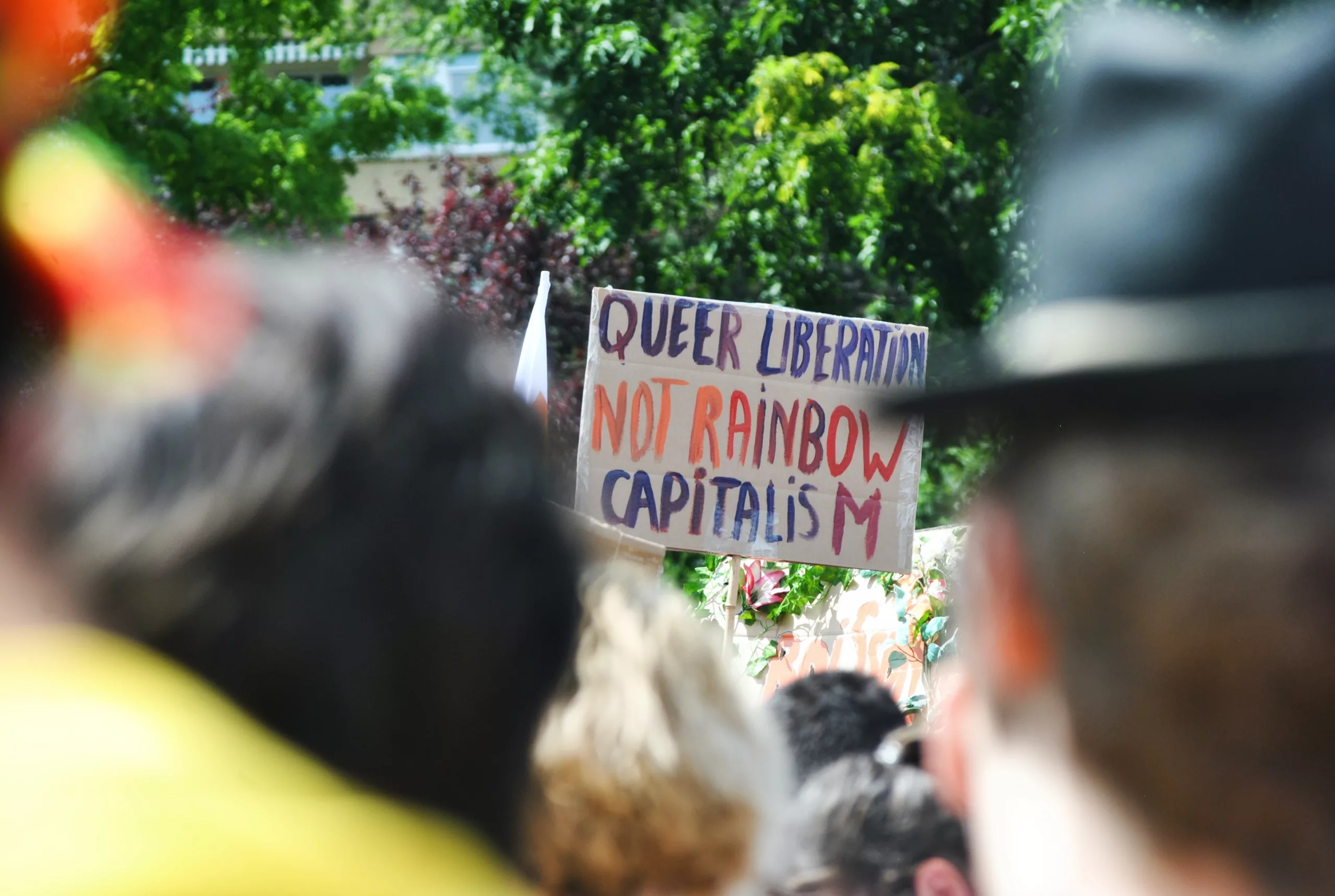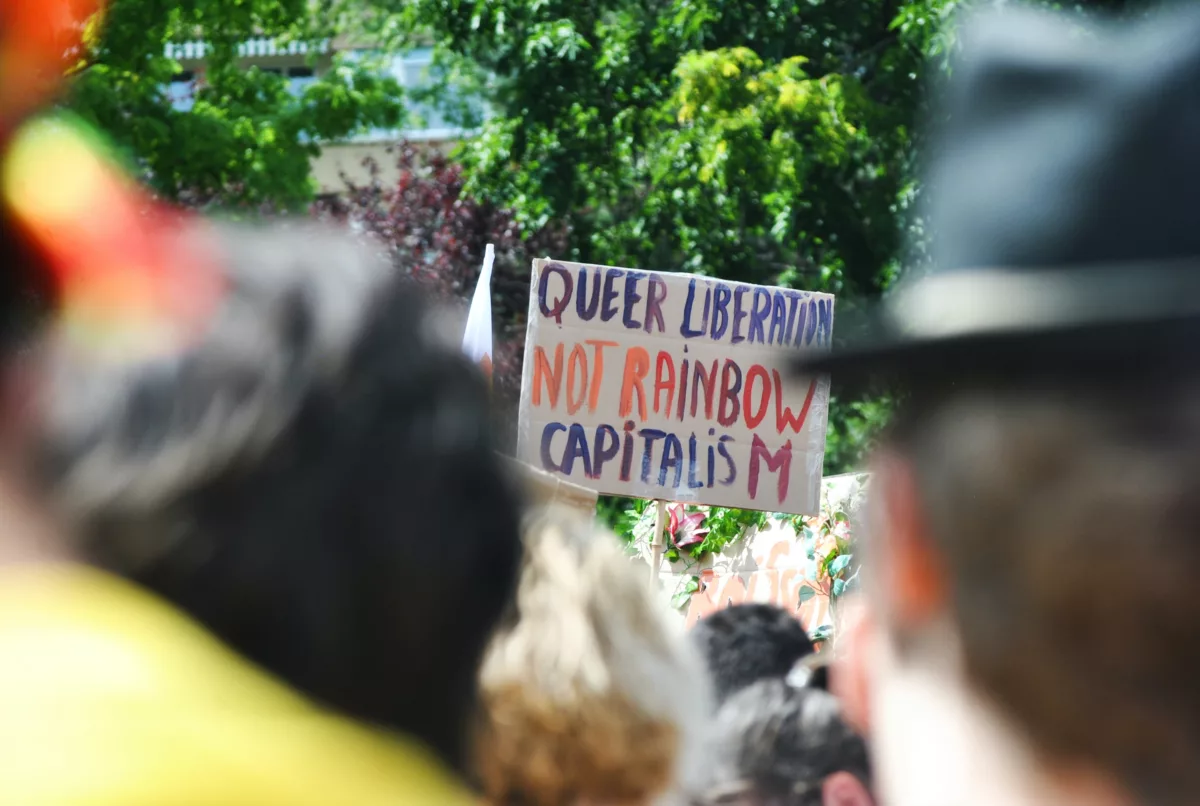Newsletter
The First Pride Was a Riot. Maybe It’s Time to Return to Those Radical Roots.
As the saying goes, the first Pride was a riot. The only way queer people have won anything is by fighting—in the courts and in the streets.


The First Pride Was a Riot. Maybe It’s Time to Return to Those Radical Roots.
by Adam M. Rhodes
It’s June, and Pride is in full bloom. Although this month is intended to be a celebration, it’s also increasingly become associated with corporate pandering, meticulously curated Pride merchandise and marketing campaigns, and gluttonous displays of rainbow capitalism. This year has put that more mainstream image to the test. As brands cave to anti-gay bigots amid a historic attack on queer lives, it’s important to remember who our allies truly are and what Pride is actually about.
The best Pride I have ever been to was four years ago in New York City—coincidentally on the 50th anniversary of the Stonewall uprising that Pride celebrations commemorate yearly across the globe.
On that hot summer day in June 2019, there were no Chase Bank or Wells Fargo floats, no police cars, no conspicuous corporate or government involvement of any kind, at least that I could tell.
Instead of glossy, logo-embossed banners proclaiming “Love Is Love,” I saw hand-made signs calling for the abolition of ICE, affirmations that “We Keep Us Safe,” and slogans decrying what was then a nascent right-wing effort to target trans people through regressive legislation. The Queer Liberation March, organized by the Reclaim Pride Coalition, was the radical antithesis to the corporate, sanitized Pride many of us have become accustomed to.
It was unlike anything I’d ever experienced, a liberating reminder that whimsical floats from corporations and political candidates don’t make Pride—we do.
The energy was electric as people gathered outside Christopher Park, across the street from the Stonewall Inn—the gay bar where a riot erupted in 1969 after police raided the hangout and arrested patrons. There was an excited tension as we kicked off the parade, slowly but assuredly walking up 7th Avenue in Manhattan. The group gained confidence as we marched. Our footsteps had more purpose, our chants bolder, our cheering louder. Our queer power was on full, fabulous display.
I wasn’t there with a large group. It was just me and one of my best friends. But I felt welcomed, not isolated. Larger groups moved to make space on the pavement. Our voices joined the chorus of chants and cheers. We were a small but important part of that manic hive moving up through Manhattan.
The events of the last year have put the power I felt that day into perspective. Queer rights have become a key front in the far-right culture war, sparking an unprecedented wave of anti-LGBTQ state legislation. It’s once again clear that we live in a world where a few powerful bigots can persuade some of the world’s largest and most profitable companies to abandon us when we need them most. Sports leagues and well-meaning business owners aren’t coming to our defense anymore. An air of quiet distress, or even fear, precedes official Pride celebrations. Will there be more protests than usual, and will they get violent? Will our celebrations even be legal?
These aren’t hyperbolic concerns. Celebrations in Florida cities like St. Cloud and Tampa have had to contend with these exact questions. In other hostile states, news of Pride cancellations has landed like a gut punch. But it’s not hard to see the logic. We are being forced to make an impossible choice between safety and community.
I’ve even contemplated sitting out this year’s festivities myself.
But then l remember the electricity of that June afternoon. I remember the people cheering out their windows and from fire escapes; the families waving from balconies; the man spinning and twirling flags on a Chelsea rooftop as we passed. I remember what Pride celebrations are actually about.
We weren’t there to placate the majority. We weren’t there to be “acceptable” queer people—an increasingly impossible metric to meet, as recent legislative attacks have made clear. We were there to be our fabulous queer selves, to take up space, to proclaim our power.
In this moment, it is especially important that we embrace the simple yet revolutionary act of proudly existing. Over the past year, we have seen legislators attempt to write us out of existence, purge our presence from bookshelves, criminalize our health care, and ban our forms of art and expression. To counter this trend, we must show up and fiercely deny those efforts to erase us. We must show them they will not win.
As the saying goes, the first Pride was a riot. The only way queer people have won anything is by fighting—in the courts and in the streets. We have won our rights not by appealing to notions of respectability and acceptability but by boldly proclaiming them as ours, by demanding them and taking them, sometimes by necessary force.
But the most important thing I remember about that June afternoon is the sense of community I felt surrounded by other queer people. We are each other’s families, our mothers, our fathers, our leaders, and our defenders. Our Pride in ourselves and each other cannot be silenced or constrained. Our celebrations may change—they may evolve or even return further to their radical roots. But they, and we, will always exist.
ICYMI — from The Appeal
After surviving a crime, the culture expects you to “pull yourself up by your bootstraps … suck it up and deal with it.” Yanqi Xu reports on major gaps in victims’ services that fail to support people in need.
Four months after 22-year-old Jordan Davidson arrived at the Gwinnett County Jail, he could no longer walk, bathe himself, or use the bathroom. A new wrongful death suit says NaphCare is to blame for his rapid decline.
In the news
Civil rights attorney Jill Collen Jefferson has been released from jail after Lexington Police arrested her while she was filming a traffic stop. Just over a week before her arrest, she had spoken with Department of Justice officials about the police department’s treatment of Black residents. [Ashton Pittman / Mississippi Free Press]
El Paso Matters’ months-long investigation into the El Paso Police Department revealed a “hostile workplace for women” and a “misogynistic work culture permissive of sexual harassment and sexism toward women officers and civilian employees alike.” [Victoria Rossi / El Paso Matters]
Before Aurora, Colorado, police officers shot and killed 14-year-old Jor’Dell Da’Shawn Richardson, he said, “Stop, please. You got me.” The child, who was Black, had a pellet gun. Police initially claimed he had a semiautomatic handgun. [Jessica Schladebeck / New York Daily News]
After less than two years as the New York Police Department Commissioner, Keechant Sewell announced that she is resigning. [Nia Prater / New York]
Indiana courts and probation offices are surveilling defendants released on bond using anti-pornography app Covenant Eyes, which also appears to block access to The Appeal. [Dhruv Mehrotra / Wired]
That’s all for this week. As always, feel free to leave us some feedback, and if you want to invest in the future of The Appeal, donate here.
